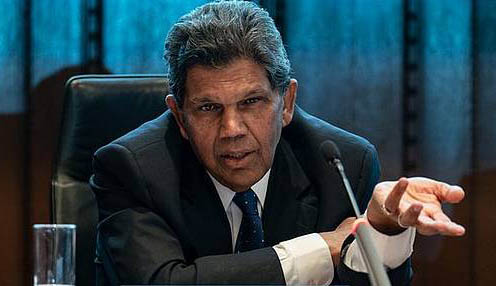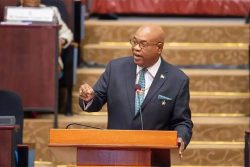Barrister-at-Law. Recipient of the Eminent International Jurist Award
of the CCJ Academy; Diploma of the Hague Academy of International Law.
On 30 June, Guyana’s lawyers argued with heart before the International Court of Justice that it has jurisdiction to hear the case and pronounce on the validity of the 1899 boundary award. There are additional arguments in support of jurisdiction that we shall elucidate here. We shall also note some troubling revelations for Guyanese in Venezuela’s Memorandum to the Court.
Dealing, first, with the revelations, paragraph 27 of Venezuela’s Memoran-dum to the Court claims that in the past “representatives of Guyana presented proposals for a practical settlement that included the transfer of important portions of territory southeast of Punta Playa”. For example, “in Caracas between November 30th and December 3rd , 1977, the Guyanese Foreign Minister Wills tried to encourage Venezuela’s involvement to finance the dam that Guyana planned to build in Alto [Upper] Mazaruni, suggesting a number of hypotheses or rectification of the boundary line.” There have also been reports that PPP leaders were also willing to entertain territorial concessions. It would be important for both of the leading political parties to come clean with Guyanese and to disclose such ideas for public discussion.
On the issue of the jurisdiction of the ICJ to hear the case, Guyana’s position is that the Geneva Agreement of 1966 authorized the United Nations Secretary-General, in the absence of agreement between the Parties to decide which means of dispute settlement under Article 33 of the United Nations Charter they must pursue to achieve a final resolution of the controversy.
Venezuela’s written memorandum argues that the 1966 Agreement merely authorised the UN Secretary-General to facilitate the parties in the choice of a method for settling the controversy, not to decide on any particular method on his own. Venezuela argues that “The principles of graduality and progressivity that must guide the settlement of the territorial dispute through political means are enshrined in Article IV.2” of the 1966 agreement.
Article IV of the 1966 Agreement provided that in the event the Parties did not come to agreement through their joint efforts, “…the Secretary-General shall choose another of the means stipulated in Article 33 of the Charter of the United Nations, and so on until the controversy has been resolved or until all the means of peaceful settlement there contemplated have been exhausted.”
Article 33 of the UN Charter lists the following among the means for peaceful settlement: negotiation, enquiry, mediation, conciliation, arbitration, judicial settlement, resort to regional agencies or agreements, or other peaceful means of the parties’ own choice.
After failed bilateral efforts since 1966 and a quarter of a century of good offices efforts of the UN, Secretary-General Antonio Guterres wrote to the Presidents of Guyana and Venezuela as follows on 30 January, 2018:
“…I have fulfilled the responsibility that has fallen to me … and, significant progress not having been made towards arriving at a full agreement for the solution of the controversy, have chosen the International Court of Justice as the means that is now to be used for its solution”
There are legal grounds in support of the ICJ’s jurisdiction going beyond those advanced by Guyana to date. First, there is the authority of the Secretary-General under Article 99 of the Charter. The Secretary-General expressly stated in his letter to the two Presidents that, in addition to the 1966 accord, he was acting in virtue of his competence under Article 99 of the Charter that entrusts him with responsibilities for the maintenance of international peace and security. The Secretary-General heads a principal organ of the United Nations. So is the World Court. The ICJ is required, in our submission, to support the exercise of authority by the Secretary-General, acting for the maintenance of international peace and security.
Then there is a second substantive ground that, in our submission, would support the jurisdiction of the ICJ. In its recent Advisory Opinion on self-determination for Mauritius and the Chagos Islands, the Court held that a territory listed on the register of the United Nations for self-determination is entitled to achieve self-determination for its whole territory. The then British Guiana was so listed in its entirety at the start of the UN decolonisation process, well before Venezuela raised its spurious claim. Guyana was, in effect, coerced by the United Kingdom, the USA and Venezuela into signing an agreement in 1966 whereby it undertook to submit the fate of two thirds of its territory to discussion. In our submission, the World Court possesses an inherent jurisdiction to hear the case and to refer it to the General Assembly so that the latter can discharge its responsibilities under the Charter to uphold the exercise of self-determination in the entire territory of British Guiana as inscribed on the decolonization register.
The ICJ’s jurisprudence has already upheld the principle of the validity of frontiers inherited from the decolonization process, as well as the principle that legal title enjoys priority as the basis of sovereignty (Frontier Dispute (Burkina Faso/Mali); Land and Maritime Boundary between Cameroon and Nigeria; Sovereignty over Palau Ligitan and Palau Sipadan: Territorial and Maritime Dispute)
Thirdly, here is a case where an Arbitral award was decided in 1899, implemented, and stood valid for more than a six decades before Venezuela sought to re-open it for international political reasons. The ICJ must exercise its role as the principal judicial organ of the United Nations to uphold the international rule of law and to uphold the validity of the Arbitral award of 1899.
Fourthly, in the Nuclear Test Cases judgments of 1974, the ICJ upheld the legal validity of oral statements made by French Governmental leaders. In the case of the Guyana border with Venezuela, successive Venezuelan governments respected and implemented the Arbitral award of 1899 for over six decades between 1899 and 1962. How, in all justice, can the World Court stand by and allow Vene-zuela to trample on this when the Court has a natural opening , an inherent jurisdiction, to pronounce on the validity of the 1899 Arbitral Award?
From the foregoing, Guyana might wish to consider supplementing its legal arguments in favour of the jurisdiction of the ICJ with additional legal grounds such as those just cited.









